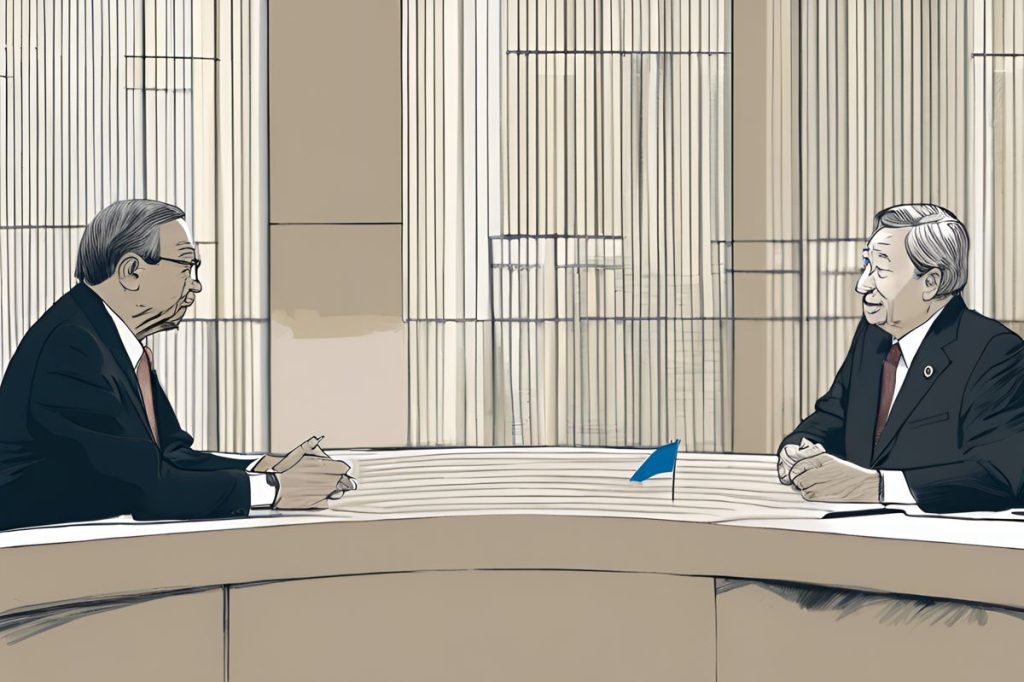UN Secretary-General António Guterres leads discussions on Cyprus division. Greek Cypriots seek renewed negotiations, while Turkish side remains firm. Tensions rise as key players navigate complex diplomatic landscape to find resolution.
What are the current diplomatic efforts regarding the division of Cyprus?
The UN Secretary-General is engaging in critical talks to address the division of Cyprus, with meetings involving key representatives to explore solutions. The Greek Cypriot administration is pushing for resumed negotiations, while Turkish Cypriots and Turkey assert their positions, amidst a tense geopolitical landscape. Progress hinges on constructive dialogue during these pivotal discussions.
UN Secretary General Engages in Crucial Discussions
The island of Cyprus finds itself once more at the nexus of intense diplomatic activity, with the United Nations Secretary-General (UNSG) António Guterres playing a pivotal role in the quest for a resolution. Guterres is set to meet with his personal envoy, Maria Angela Holguin, at the UN headquarters in New York. This meeting aims to delve into the complexities of the Cyprus issue and explore potential paths forward amid ongoing tensions.
Turkish Defense Minister, Yasar Guler, with his recent remarks, has added fuel to the fire. On the approach of the 50-year mark since the Cyprus intervention, Guler referred to the Turkish military operation as a “peace operation” and claimed it as part of Turkey’s “glorious history.” Such statements have done little to ease the strained atmosphere surrounding the discussions.
The Greek Cypriot Position and Turkish Statements
In parallel efforts, the Greek Cypriot administration has not wavered in its call for the resumption of talks. Deputy government spokesman Yiannis Antoniou, in comments to the state broadcaster, acknowledged that the prospects for restarting negotiations are not looking optimistic at present. Despite this, the government’s commitment to finding a solution to the stalemate remains unwavering.
Intriguingly, at an event organized by the Belgian ambassador to Cyprus, President Nikos Christodoulides disclosed that Greek Foreign Minister George Gerapetritis will present “very specific messages” to the UNSG. Christodoulides hinted at the openness of the Republic to initiate dialogue and the anticipation of positive developments stemming from the New York meetings. “We are ready from our side,” he stated, signaling a readiness to engage in constructive conversation.
Turkish Cypriot Leadership and International Interaction
Amid these developments, the Turkish Cypriot leader, Ersin Tatar, delivered a speech highlighting the gains made by the Turkish Cypriot community since 1974. He portrayed the Turkish intervention as a peacekeeping success and outlined ambitions to fortify and evolve the unrecognized state’s presence in the region. Tatar’s discourse extended to infrastructural integration with Turkey, emphasizing the strategic connection through water and electricity networks.
Furthermore, representatives from the Turkish Cypriot side have been active on the international stage. At a recent meeting of the Parliamentary Assembly of the Council of Europe (PACE), the Varosha issue was scrutinized. Turkish Cypriot MP Oguzhan Hasipoglu challenged the relevancy of the 1984 UN Security Council resolution on Varosha, proposing that local property commission activities render it obsolete. Hasipoglu also accused the Greek Cypriots of consistently rejecting solutions, reflecting the deep-seated divisions that continue to plague reconciliation efforts.
A Tense Landscape and the Road Ahead
As the UNSG and various stakeholders convene to discuss the future of Cyprus, the geopolitical landscape remains tense. The Greek Cypriot side stresses the necessity for dialogue, while the Turkish side defends its historical actions and pushes for recognition of its interests. With defense ministers and foreign dignitaries exchanging contentious remarks and Turkish Cypriot leadership asserting its gains, the international community watches closely.
These talks at the UN are more than mere formalities; they carry the potential to shape the fate of an island that has been divided for decades. As influential players present their cases and outline their conditions, the hope for progress and an eventual reconciliatory agreement hangs in the balance. The eyes of the world remain fixed on these critical deliberations, as the quest for a peaceful resolution to the Cyprus issue endures.
What are the current diplomatic efforts regarding the division of Cyprus?
The UN Secretary-General is engaging in critical talks to address the division of Cyprus, with meetings involving key representatives to explore solutions. The Greek Cypriot administration is pushing for resumed negotiations, while Turkish Cypriots and Turkey assert their positions, amidst a tense geopolitical landscape. Progress hinges on constructive dialogue during these pivotal discussions.
What role is the UN Secretary General playing in these discussions?
The UN Secretary-General, António Guterres, is leading discussions on the division of Cyprus, seeking to facilitate dialogue and explore potential paths to resolution. His personal envoy, Maria Angela Holguin, is also involved in these crucial talks to address the complexities of the Cyprus issue and navigate the tensions surrounding the situation.
What are some recent statements made by key players in the Cyprus division?
Turkish Defense Minister Yasar Guler referred to the Turkish military operation in Cyprus as a “peace operation” and highlighted its significance in Turkey’s history. The Greek Cypriot administration has expressed readiness to engage in dialogue, with Greek Foreign Minister George Gerapetritis set to present specific messages to the UNSG. Turkish Cypriot leader Ersin Tatar emphasized the gains made by the Turkish Cypriot community since 1974 and outlined ambitions for infrastructural integration with Turkey.
How are international interactions shaping the discussions on Cyprus division?
Representatives from the Turkish Cypriot side have been active in international arenas like the Parliamentary Assembly of the Council of Europe, addressing issues like Varosha and accusing Greek Cypriots of obstructing solutions. These interactions, along with the statements from key players, reflect the deep-seated divisions and complexities that surround the Cyprus division discussions.

